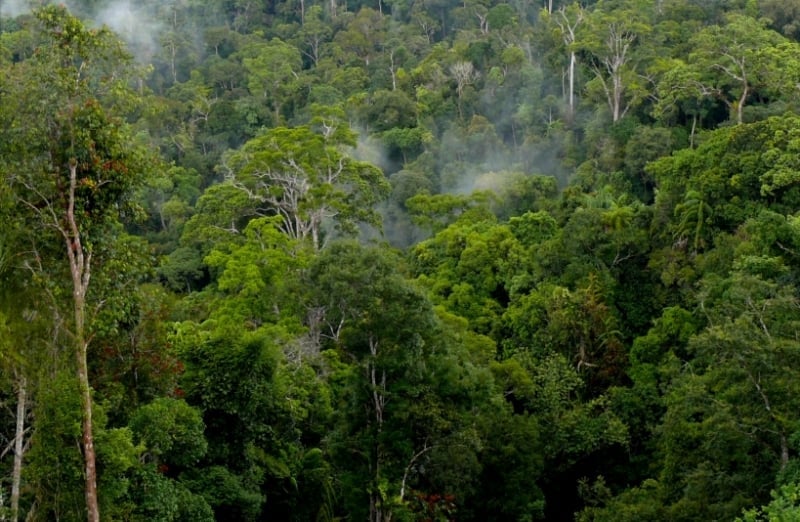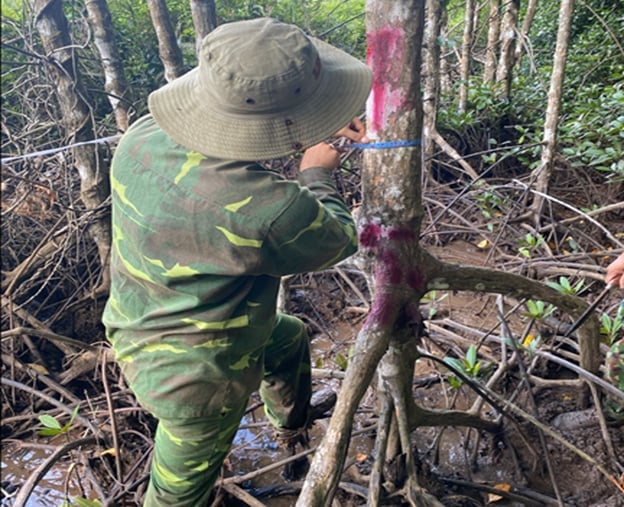December 6, 2025 | 00:00 GMT +7
December 6, 2025 | 00:00 GMT +7
Hotline: 0913.378.918
December 6, 2025 | 00:00 GMT +7
Hotline: 0913.378.918
The Ministry of Agriculture and Environment is currently seeking public feedback on the draft Decree regulating forest carbon sequestration services. This Decree provides detailed guidance on Clause 5, Article 63 of the Law on Forestry, covering subjects, forms, payment levels, and the management and use of funds from forest carbon sequestration services. Additionally, it supplements provisions on principles, conditions for providing and using the services, and the implementation of forest carbon absorption and storage.
In practice, after nearly three years of piloting the transfer of emission reduction results and managing financial revenues from forest carbon, it has been shown that this is a new source of income for reinvestment in forest protection and development, receiving strong support from local communities. However, during implementation, several challenges have arisen, particularly regarding the use of revenue from the transfer of emission reductions by forest owners who are organizations and identifying the rightful beneficiaries.
Notably, there are still no specific regulations on payment levels or cost coverage for necessary activities such as measurement, reporting, verification of emission reductions; forest carbon monitoring; capacity building; and the resolution of disputes and complaints.
Currently, several international partners are actively cooperating with the Ministry of Agriculture and Environment to discuss and negotiate carbon credit exchange agreements. Some provinces (e.g., Quang Nam, Lao Cai, Son La) have received approval in principle from the Prime Minister to pilot forest carbon sequestration service projects. However, implementation has stalled due to the lack of a national legal framework for the exchange and transfer of emission reduction results and forest carbon credits.

Revenue from forest carbon is reinvested in forest protection and development efforts. Illustrative image.
Most recently, the Government issued Decree No. 119/2025/NĐ-CP on June 9, 2025, amending and supplementing several articles of Decree No. 06/2022/NĐ-CP. This includes regulations on the procedures for developing, appraising, and approving carbon projects in general, and stipulates that only organizations may register carbon projects. However, it does not yet specify which agency is responsible for implementing forest carbon projects.
Meanwhile, under the 2017 Law on Forestry, forest ownership in Vietnam includes forests owned by the entire people, as well as those owned by organizations, households, individuals, and local communities. This highlights the need for clear regulations on which entities - agencies, organizations, or individuals - are eligible to implement forest carbon projects, in accordance with the diverse forest ownership structures in the country.
Therefore, alongside detailing Clause 5, Article 63 of the 2017 Law on Forestry, the draft decree also adds provisions to create a legal framework for the exchange and transfer of emission reduction results and forest carbon credits. This includes regulations on the issuance of forest carbon credits to enable trading on the carbon market.
According to the drafting agency, providers of forest carbon sequestration services must register to develop and implement forest carbon projects in accordance with legal regulations. This includes ensuring all activities from emission reduction results generation to measurement, reporting, and verification of emission reductions; issuance of forest carbon credits; and contributing to the nationally determined contributions (NDC) and other obligations set by the country. Service provision can be carried out through various forms, such as contracts or transactions on the domestic carbon trading platform.

Mangrove tree circumference measurement for CO₂ emission reduction calculations. Photo: Trung Nguyen.
Service users must be organizations legally operating under Vietnamese law, committed to fulfilling the terms of the contract or the operational mechanisms of the domestic carbon trading platform, and fully complying with related financial obligations as prescribed by law.
In principle, the draft decree clearly states that the provision and use of forest carbon sequestration services must ensure transparency, responsibility, and balance the interests of the State, forest owners, and related parties. At the same time, it must ensure no impact on the implementation of Vietnam’s international commitments to greenhouse gas emission reductions.
Emission reduction results and forest carbon credits that have been exchanged or transferred through contracts or on the carbon trading platform cannot be further exchanged or transferred by the service provider to other users. Revenues from the exchange or transfer of emission reduction results and forest carbon credits belong to the forest owners and must be used for activities serving forest protection and development. Cooperation among parties to implement forest carbon projects and share benefits from the exchange and transfer of emission reduction results and forest carbon credits is encouraged.
According to the 2022 updated Nationally Determined Contribution (NDC) under the Paris Agreement on climate change, Vietnam aims to reduce 146.3 million tons of CO₂ equivalent by 2030 through domestic efforts, with the potential to increase reductions up to 403.7 million tons of CO₂ equivalent with international support. Vietnam’s national climate change strategy through 2050 also sets the goal of achieving net-zero emissions.
Translated by Phuong Linh
/2025/12/02/2629-3-141849_60.jpg)
(VAN) Based on its large-scale planted forests, several rubber enterprises have proactively conducted greenhouse gas emission inventories in preparation for entering the forest carbon credit market.

(VAN) MAE is leading in developing a national rare earth strategy, which will be submitted to the competent authorities for promulgation in early 2026.
/2025/12/02/4006-4-092040_652.jpg)
(VAN) The model of converting low-efficiency rice land to aquaculture in many localities has helped increase incomes by 5 to 15 times, improve the environment, and form new fisheries economic zones.

(VAN) Funded by ACIAR, Project FST/2020/123 focuses on measures to prevent harmful alien species, thereby protecting forests from invasive threats.

(VAN) The National Assembly's Supervisory Delegation pointed out solutions for the blue economy, circular economy, environmental protection, and technology application for sustainable marine governance.

(VAN) Lao Cai’s forestry sector is stepping into the spotlight with a series of pioneering initiatives in forest management, monitoring, and sustainable development aimed at generating carbon credits.

(VAN) The Provincial Competitiveness and Governance Index (PCGI) is a tool designed to reflect the quality of local governance.